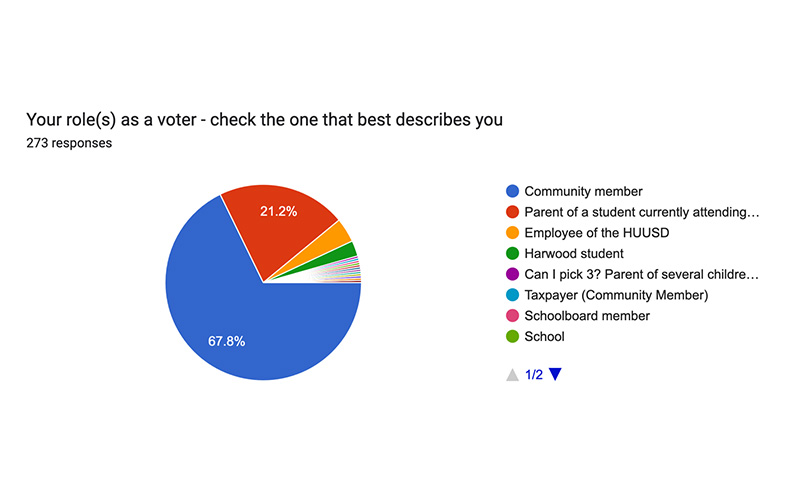Voters have strong opinions on the Harwood Unified Union School District survey from the Waterbury Roundabout and The Valley Reporter and they’re not afraid to voice them.
That survey asks voters if they voted, how they voted on the $50.8 million budget, a proposed transfer of a fund balance of $535,000 to the district’s maintenance reserve fund, why they voted the way they did and what it would take for them to support a new budget.
Voters rejected the HUUSD budget 1,439 yes to 2,640 no votes at Town Meeting last week. The survey went live on March 6 and as of press time on March 13, there are 275 responses. The survey will remain open until Sunday, March 17.
The Valley Reporter and Waterbury Roundabout will share the survey data with the school board and the district leadership once the data is anonymized. The school board is in the process of reducing the budget with the expectation that it will be adopted on April 10 and voted on after May 10.
Survey respondents are balanced throughout the district in terms of who responded. The distribution is close to the population spread of school district towns.

In terms of who is responding, the graph shows that the bulk are community members. There are smaller categories that do not appear on this graphic of respondents that include categories like second-home owner, grandparent, former employee, or others.

In response to questions about why respondents voted for or against the school budget, many people cited the significant increases in education taxes while others cited the state’s failure to address the flaws in its education funding formula.
Here’s one response:
It was mainly due to the sharp property tax increase on the horizon. I financially see that as unsustainable and we as Vermonters needed to paint a picture that legislation needs to overhaul how education spending is paid for. I'd also like to see the school district have a more marginal increase in spending, like 5%. The 12% increase was just too much in my mind.
And here is another:
Until there is a clear and definitive tax impact outlined, I cannot support this. The state has done a disservice to the district by not addressing this prior to the vote. Perhaps it should’ve been postponed. The state needs to also reevaluate how the education fund is allocated. If my taxes will increase at the hypothetical rates of 20-40% I would expect that a majority, if not all, would go directly to our district and not others.
Here is a response from someone who voted yes:
As a longtime resident, parent, and teacher in the district I am a strong advocate of public education. While I know that voting yes for the budget would impact my property taxes significantly, my belief in public education overrode the increased taxes. I appreciate the board trying to put forth a modest budget which allowed for growth for our children. The framing from the state that districts are overspending, and that health care costs and salaries are to blame for the increased costs may or may not be true. What is true is that health care costs are not controlled by the districts. If the state truly wanted to control costs, they would work diligently to create a single payer system and find a better way to fund education than just property taxes.
In response to a question of why people voted for putting the $535,000 surplus into the maintenance reserve fund, here are three typical responses:
To reinforce the message.
Simple, we need to maintain our buildings.
These buildings are, literally, falling apart.
And for what it would take for people to support the bond on the revote, the responses vary widely. Here are a couple:
A smaller increase - and then how it reflects property taxes.
Come up with a budget that does not raise our taxes and I will vote for it.
I will vote yes but our legislature needs to get the message (one third of budgets voted down) that they need to step up and tackle the hard issues of funding and health care.
The survey can be found here: www.tinyurl.com/HUbudgetvotesurvey













